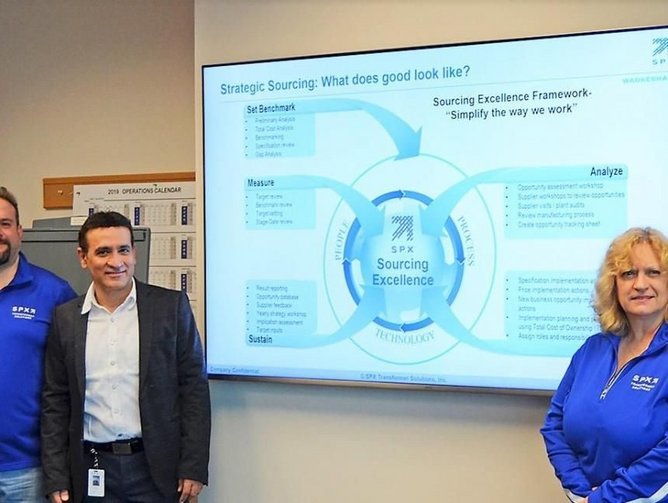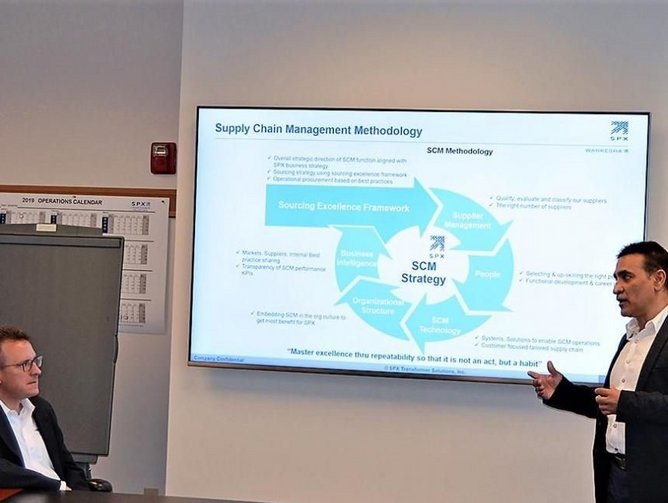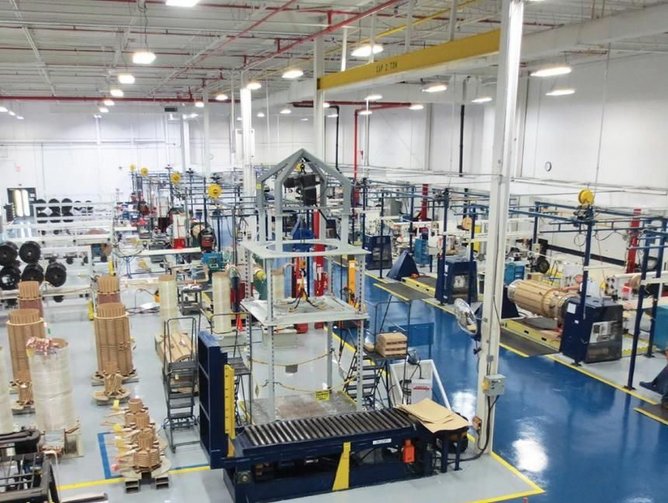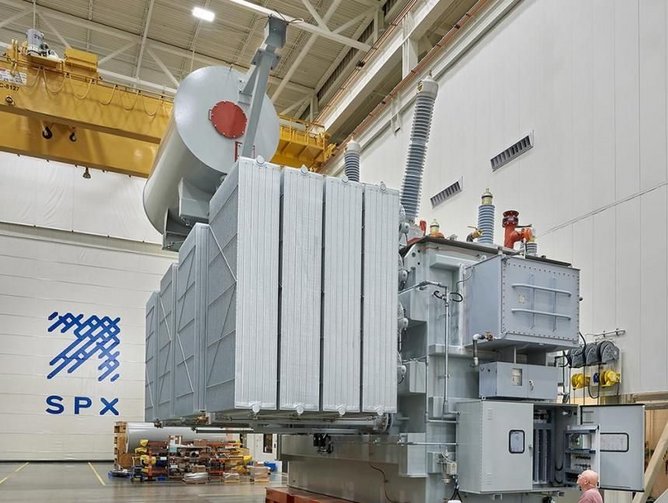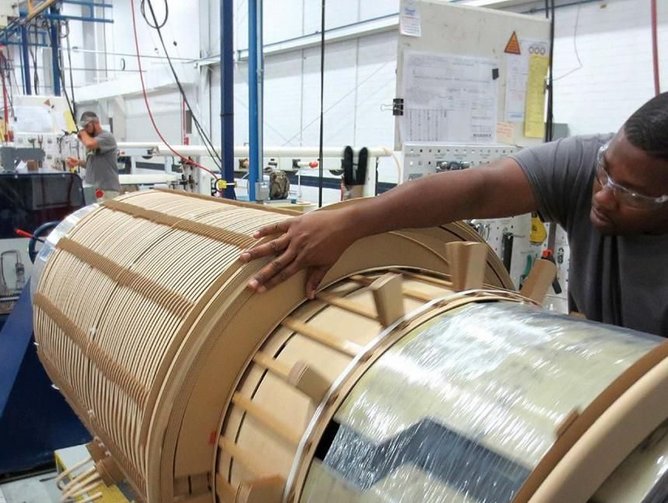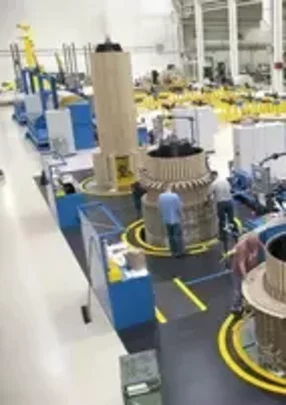SPX Transformer Solutions aims to “simplify the way we work” through customer focused and tailored supply chain
As a key aspect of the SPX Corporation’s value creation roadmap, strategic sourcing is expanding from a back-office function to an integral efficiency improvement operation. “SPX Transformer Solutions’ value creation roadmaps target operational excellence and margin expansions through continuous improvements and excellence initiatives in Engineering, Sourcing and Manufacturing,” notes Sandeep Arora, Vice President of Global Sourcing and Strategy at SPX Transformer Solutions. “In that way, strategic sourcing and supply chain management remains one of the core functions of transformer business and thereby becomes a part of the value creation roadmap for SPX Corporation as a whole.”
SPX Transformer Solutions operates medium and large power transformer manufacturing plants in Waukesha, WI and Goldsboro, NC as well as components division manufacturing Transformer Health Products® in Dallas, TX.
Arora joined SPX Transformer Solutions in 2014 and has more than 25 years of transformer and switchgear industry experience in the Transmission and Distribution energy sector. Arora has held positions as Managing Director at Schneider Electric’s Distribution Transformer business in the India Region, as well as VP of Business Development and Supply Chain at Schneider Electric’s US-based Distribution Transformer division. Arora has also held the position of Plant Manager at CG Power within the Medium Power Transformer business in the US and Deputy General Manager of Operations, Supply Chain and Projects at the same firm, working in the Large Power Transformers unit in India. He is a proven international leader skilled in flexing global operations to meet changes in customer cost and spend requirements.
Arora explains “My role is essentially to work closely with the business functions to create a culture of executing customer satisfaction, focused on cost, efficiency improvements, and supplier performance.” Arora adds, “one key step for me as a supply chain and sourcing leader is to meet with internal departments and suppliers to identify the pain points and improve operational efficiency.” He further states that by having open conversations with key suppliers and partners, the company has turned its supply chain into a network where information is shared in trust to have a win-win strategy.
Since 2015, the SPX Transformer Solutions team has driven the supply chain methodology using sourcing excellence framework which is now well established and followed within the business.
Strategic Sourcing: What does good look like?
The Sourcing Excellence Framework (SEF) helps the business drive operational efficiency and margin stability when price volatility and supply chain risk on commodities exist. For example, commodities like steel and aluminum – mainly driven by section 232 tariffs – continue to be unfavorable to transformer original equipment manufacturers (OEMs) in the US.
“Since 2018, our proactive approach in implementing the Sourcing Excellence Framework has helped us mitigate some supply chain risks mainly driven by trade actions on steel and aluminum. This in large power transformers has made US Transformer manufacturers non-competitive due to imports coming from other regions,” Arora notes.
The sourcing framework was put in place to ensure our supply chain is smooth and effective, as it enables us to manage our top suppliers using 80/20 rule. The 80/20 rule focuses on 80% of our overall direct spend which is managed by 20% of suppliers. By having long-term dual sourcing contracts and vendor consolidation we get better reliability and repeatability. Arora says: “The sourcing excellence framework, as it is based on Total Cost of Ownership (TCO), also addresses vendor consolidation and in-sourcing, thereby leveraging synergies across other SPX Corporation businesses. It has also helped the procurement function to be “Future Proof” through “Balanced Enforcement and Enablement”.
In SPX Transformer Solutions, the latest transformation is the digitization of its procurement operations. “With supplier spend data analytics, we’re aiming to further improve supplier performance on Quality, Cost and Delivery (QCD) through digitization. We’re currently using the software interface-Qlik which talks to our Enterprise Resource Planning (ERP) system and other softwares for real-time analysis of data. Along with this, we have integrated a contract management tool to manage Master Procurement Agreements and drive business process improvements” says Arora. The mantra here is to “simplify the way we work”.
To further strengthen the SPX Transformer Solutions continuous improvement and performance management culture in terms of “what does good look like in sourcing” Arora collaborates with his peers and team members by asking questions which helps the business to remain competitive:
- Do we have a long-term contract with our top suppliers to control 80% of our total spend?
- Do we have a firm price contract using the ‘should cost’ model to avoid price increase risks?
- Do we have dual sourcing?
- Do we have the right payment terms with our suppliers to support our operating working capital?
- Do we have the right Incoterms® with our vendors?
- Do we have the right inventory carrying cost and turns ratio?
The company’s tools address these uncertainties.
The other major contributor towards our transformation is the Supply Chain Management (SCM) strategy. The SCM strategy has five intrinsic elements to its approach other than sourcing. “When we talk about the SCM strategy we start with sourcing, which is made up of two parts:- strategic, which includes risk mitigation strategy through dual sourcing using should cost model and operational, which includes transactional day-to-day buying,” states Arora.
Supply Chain Management Strategy
“Besides sourcing, supplier management is the other important piece of SCM strategy, in which we assess how we qualify, evaluate and classify our suppliers. We also ensure that we have dual sourcing in place, so that we are not caught unaware when a single source supplier is no longer viable on QCD” says Arora.
Then we must talk about people – to implement any strategy, we need engagement of our employees. People can become a major challenge if not involved at the right time as before introducing new suppliers manufacturing employees need to be ready to accept and manage the change effectively. For achieving this, first and foremost we need to select and upskill the right staff by providing carrier paths through functional development. Finally, we look at organization structure and business intelligence to get optimum benefits by aligning SCM strategy to our business strategy.
For SPX Transformer Solutions, SCM strategy is more than just a buzz word – it’s a habit that defines the business’ culture and enables continuous improvement. According to Arora to drive sourcing excellence initiatives, “continuous improvement should be embeded in the culture of organization.”
Ultimately, the business aims to improve operational efficiency, which Arora claims can be achieved within these three functions in an organization: one is through redesign to cost, which is led by engineering, the other is productivity improvement, which is driven by manufacturing and the final one is sourcing efficiencies driven through a sourcing excellence framework. In regards to the financial impact, as Cost Of Goods Sold (COGS) is the largest contributor to transformer operational cost, and therefore the biggest opportunity to improve COGS lies in the sourcing bucket.
To implement a successful SCM strategy with highest value creation, the firm has aligned a sourcing excellence framework to internal manufacturing and engineering capabilities.
Arora adds that the company’s supply chain transformation journey in 2015 would not have started without the support of suppliers and partners. “These long-term strategic partnerships encourage SPX Transformer Solutions team and its suppliers, to focus less on immediate fluctuations in the market and more on value creation types of opportunities together outside of the daily buyer and seller arrangement. Companies committed to one another are better positioned to share the impact of price fluctuations together resulting in more stability over the long run.”
Arora concludes by echoing SPX Transformer Solutions’ President-Brian Mason’s belief, “As SPX puts its business system strategy using operational excellence in place, it aims to leverage synergies between its portfolio of products to drive company growth in an ‘efficient and organic’ way.”
